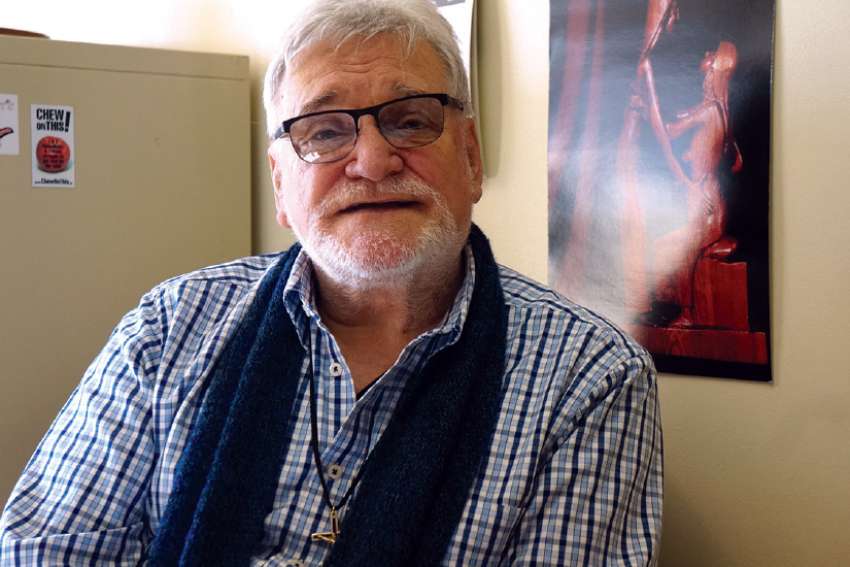Rego, the Oblate-in-Residence at the Ottawa university, transformed the Oblate Lacombe province’s centre for Justice, Peace and Integrity of Creation (JPIC) into the Centre Oblat, and now he has happily handed it over to its new executive director and old friend Joe Gunn.
“JPIC has given birth to the new centre,” said a beaming Rego. “This birth is going to be reproductive because it’s built on solid ground.
“The Centre Oblat will be like an octopus, with legs and hands everywhere.”
“If we can do half of what Len’s vision is, we will be right up there with the best social justice movements in the world,” said Gunn. “He’s a big vision guy.”
The Centre Oblat is to be a hub, connecting faculties at SPU, Catholic Church agencies and ecumenical organizations, NGOs and grassroots movements, Rego said. It will provide resources and encourage missionary vocations in social justice, eventually with opportunities for students to serve in Africa, Asia, Latin America or Europe in their second or third year at the university.
The centre will also support the vision of the three Oblate provinces in Canada that have combined resources to further the project that the Lacombe Province began in funding JPIC almost six years ago. It will continue its focus on advocating on behalf of Indigenous peoples as well on responsible mining, human rights and ecology.
Rego, 75, will stay on as Oblate-in-Residence in a separate building from the new centre, but he is prepared to offer support whenever Gunn needs it.
“I’m sure he’ll offer more than support,” Gunn said. “He will encourage, he will goad, he will kid and he’ll celebrate every step of this journey.”
Rego’s own journey started in the Azores region of Portugal. He came to Canada in 1967 and joined the Oblates in 1973, inspired by missionary work.
After 38 years serving in Peru, Rego returned to Ottawa because a bad hip caused mobility problems that made it increasingly difficult to stay in the field.
“When I came home I had no idea what I was going to do,” he said. “I was just coming home to learn how to be a missionary in Canada without being grouchy.
“It is so easy to be grouchy because we have everything in Canada,” he said, contrasting that with the attitude of the poor who have little but show gratitude for the little they have.
He had some surgeries and worked with TB patients, a women’s group and a soup kitchen until his provincial, Fr. Ken Foster, approached him almost six years ago and asked him to start the JPIC office.
“When he offered me that, I was very humbled,” he said. He asked his provincial to give him a day to make up his mind.
The first person he called for advice was Gunn, who said to him, “Go for it, Leonardo!”
“I trusted in God that He would do the rest,” said Rego.
“I think Len, returning after nearly 40 years in Peru, saw and still sees the need for social and ecological justice to become a reality in our own country,” said Gunn. “His work in Canada is an extension of his own vocation which has been rooted in concern for the poor and for religious life to be a location for moving the yardsticks forward to make a better world.”
In Peru, Regu became a disciple of Fr. Gustavo Gutiérrez, the father of liberation theology. Rego described Gutiérrez’ theology as empowering the poor to “take responsibility for their future, their destiny.”
“These were times of suffering and repression, poverty, hunger and despair,” he said. The churches taught the poor the “responsibility to speak out” and “how to defend their rights and engage in the work necessary to change the system.”
Also inspiring Rego was St. Archbishop Oscar Romero, who was assassinated while saying Mass in his native El Salvador. Though he never met the archbishop, Rego said, “he has always been my friend and my example.”
“Men and women who make a difference, they all pay a price, some more drastic than others,” he said. “Jesus paid a price. They always pay a price for a better world.
“That’s why I feel good in this job,” he said. “Sometimes there are so many things against you and pushing you back, but that is how things change. That’s the vocation of a missionary, permanently working for change.”
But Rego said it’s important not to get angry at the forces that push back. “If you get angry, you don’t give a good witness,” he said.
Support The Catholic Register
Unlike many other news websites, The Catholic Register has never charged readers for access to the news and information on our site. We want to keep our award-winning journalism as widely available as possible. But we need your help.
For more than 125 years, The Register has been a trusted source of faith based journalism. By making even a small donation you help ensure our future as an important voice in the Catholic Church. If you support the mission of Catholic journalism, please donate today. Thank you.


